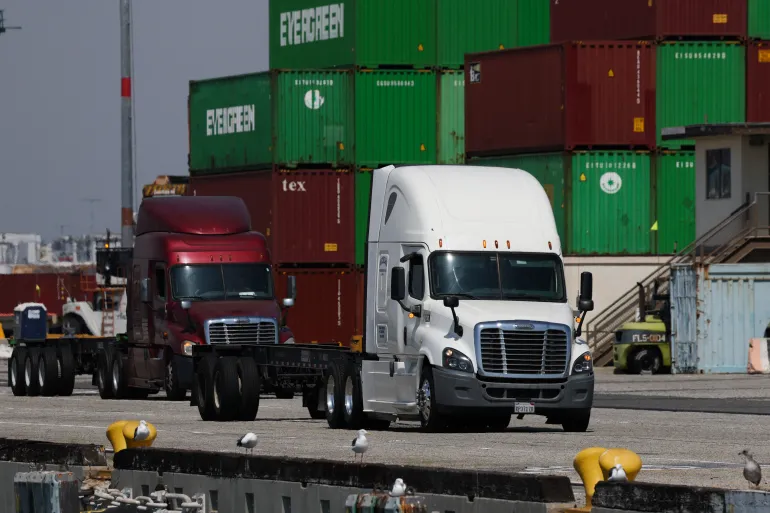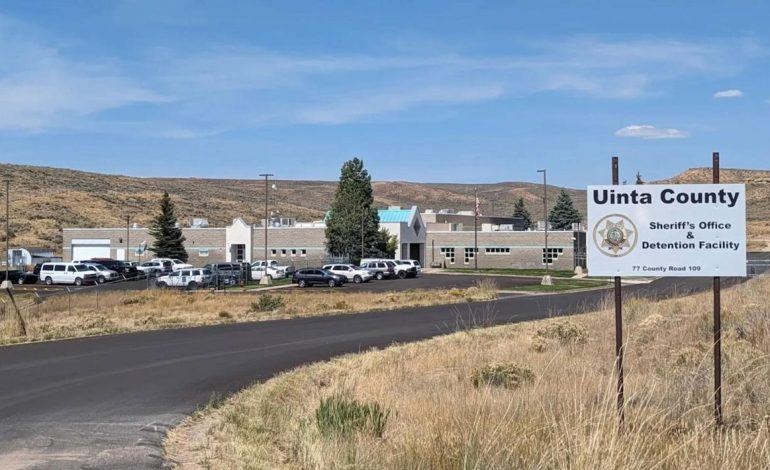When the chaos started, she was just a mom in a parking lot, tending to her baby, Casper Star Tribune reports.
She was outside a horse track near Wilder, Idaho, on Oct. 19, a spot popular with local Hispanic families. People were drifting back to their cars, chatting, watching the races. Then she noticed something strange: spectators suddenly running into nearby fields.
Then came the helicopters.
She looked up, stepped out of the car, and saw patrol vehicles and SUVs flooding into the area. Armed officers were moving in around the track.
“I was like, what is going on?” she later recalled.
Her first thought wasn’t about herself or her four siblings — all US citizens. It was about their dad, an immigrant who was somewhere else inside the facility.
“Oh my God, my dad,” she said. “He is not coming home with us today.”
She was right.
Her father was one of more than 100 people detained that day in a massive immigration sweep led by US Immigration and Customs Enforcement (ICE), backed by federal and local officers. Now he’s sitting in a Wyoming jail, suing for his freedom.
The woman spoke to WyoFile on the condition that neither she nor her family be named, fearing harassment or retaliation from federal officials and anti-immigrant groups.
After the raid, the man was moved hundreds of miles away from Idaho to Uinta County Jail in Evanston, Wyoming, and later transferred to the Sweetwater County Detention Center in Rock Springs.
He’s now challenging that detention as unconstitutional in federal court in Casper.
At a Nov. 12 hearing, his attorney, Jacob Rourk, asked US District Judge Scott Skavdahl to order the man’s release or at least require a bond hearing — a chance to argue that he should be allowed to go home to his family while his immigration case moves forward.
The family depends on his income, Rourk told the court. And unlike the picture often painted in political speeches, he said, this man doesn’t fit the profile of some hardened criminal.
According to Rourk, his client:
- Has no criminal record in the United States;
- Has lived here for about 20 years;
- Has not returned to his native Mexico in two decades.
“The government is advocating for [his] indefinite detention without care or attention paid to whether he is a flight risk or a danger to the community,” Rourk argued. “He is neither of those things.”
Government attorneys did not dispute in open court that the man lacked a criminal record.
If that’s accurate, it means two Wyoming counties — Uinta and Sweetwater — have jailed a man whose only legal violation is entering the country without authorization years ago.
That stands in contrast to public statements by the US Department of Homeland Security, which frequently says it is targeting “the worst of the worst,” as well as people who entered during recent surges in illegal immigration. This man appears to fall into neither category.
National data shows that under the current enforcement push, more than 70% of people detained by ICE have no criminal convictions, according to immigration researchers.
Back in June, Uinta County Sheriff Andy Kopp announced that his jail would begin housing ICE detainees in a revenue-raising deal with the federal government. The money, he said, would help the county afford pay raises for deputies as falling property tax revenues squeezed local budgets.
Kopp told county commissioners that the federal detainees would all have criminal records and would be held for no more than 72 hours as they were moved around the immigration system.
But the Idaho father’s experience appears very different. His family and attorney say he’s a father of five, swept up in a mass raid, not a convicted criminal plucked out of a prison system somewhere else.
“He has always said he works his butt off for us,” his daughter said, “and we can pay him back by becoming who we want to be in life.”
Kopp declined to discuss the case with WyoFile, other than confirming that the man had been transferred to Sweetwater County. He is listed as a defendant in the man’s habeas corpus petition — a legal move where a jailed person asks a court to review whether their detention is lawful. By law, the petition must name the person in charge of the jail where they’re held.
Kopp attended the hearing and was represented by a county attorney but did not argue. The courtroom debate played out instead between Rourk and Levi Martin, an attorney for the US Attorney’s Office in Wyoming.
Rourk asked Judge Skavdahl to stop ICE from transferring his client out of Wyoming while the case is being considered. He said the agency has repeatedly bounced detainees between facilities around the country, making it harder for families and lawyers to stay in contact.
Skavdahl agreed to temporarily block any further transfers while he weighs the request for release or a bond hearing.
It’s not clear why the man was moved from Uinta County to Sweetwater County earlier in the week.
Rourk also made an unusual request: that if the judge orders a bond hearing, Skavdahl himself handle it — rather than handing the case over to immigration court.
Immigration courts are part of the executive branch, not the independent judiciary. Immigration judges work under the US Department of Justice, not Article III federal courts like Skavdahl’s.
Rourk argued that amid the current enforcement climate, immigration judges are increasingly leaving people in detention for months, even when the law allows them to return home on bond.
Skavdahl seemed skeptical.
“So I should presume that [immigration judges] won’t follow the law?” he asked.
Rourk pointed to a case out of Washington state, where immigration advocates say judges in the Seattle area ignored a federal court order requiring them to provide opportunities for bond.
Martin, the federal lawyer, pushed back. If there’s going to be a bond hearing at all, he argued, it should be in immigration court — not before Skavdahl.
Martin didn’t contest that the man had no criminal record but took a swipe at his judgment, saying he’d taken “minors to an illegal gambling operation where he was detained.”
The daughter saw it differently: to her, it was simply a family outing to the races, a social gathering that turned into a nightmare.
Federal officials say the Oct. 19 raid at the racetrack was part of an investigation into an illegal betting ring, with ICE assisting the Federal Bureau of Investigation. The track owner and four others now face felony gambling charges, according to Idaho media reports.
The horse racing itself appears to have been a licensed event, and the raid came on the last day of the 2025 racing season.
What shocked many in Idaho was the scale and style of the operation:
- More than 200 federal and local officers participated;
- Authorities initially detained over 400 people;
- ICE made 105 immigration arrests.
Critics say officers knowingly targeted an event favored by Hispanic families, including many US citizens and mixed-status households, ensuring a rich field of potential deportation cases.
Some attendees are considering legal action over alleged injuries and trauma, including aggressive tactics used around minors.
The woman who spoke to WyoFile said she and her siblings — ages 15 and 11 among them — were handcuffed with tight plastic zip ties and held for hours while they waited to prove they were citizens.
Initially, the FBI denied using zip ties on children. That stance softened after photos surfaced showing a handcuffed minor, according to Idaho news coverage.
The woman said her family was restrained for about four hours. The only reason she wasn’t cuffed, she said, was because officers wanted her free to care for her baby.
At first, they weren’t with their father. When they finally saw him, it was through the plastic windows of a tent where he was being held.
Once agents verified that someone was lawfully in the country, they placed a green wristband on them, she said. When she spotted her dad again, he was wearing red — marked for immigration detention.
She and her siblings begged officers to let them say goodbye. After some reluctance, they were allowed a brief moment together.
Now, as lawyers fight over bond hearings and jurisdiction in a Casper courtroom, the family is trying to hold things together at home.
The kids are shaken. Her younger brothers, she said, “are still in shock and they haven’t fully understood what happened.”
The other day, she walked in on the 11-year-old, face buried under a pillow, crying.
“He didn’t want anyone to see it,” she said.
Meanwhile, their dad is sitting in a Wyoming jail more than 400 miles from the racetrack where he was picked up — and even farther from the home where, for 20 years, he worked quietly to support his family.
Whether he gets the chance to return there while his immigration case plays out is now in the hands of a federal judge in Casper.










The latest news in your social feeds
Subscribe to our social media platforms to stay tuned